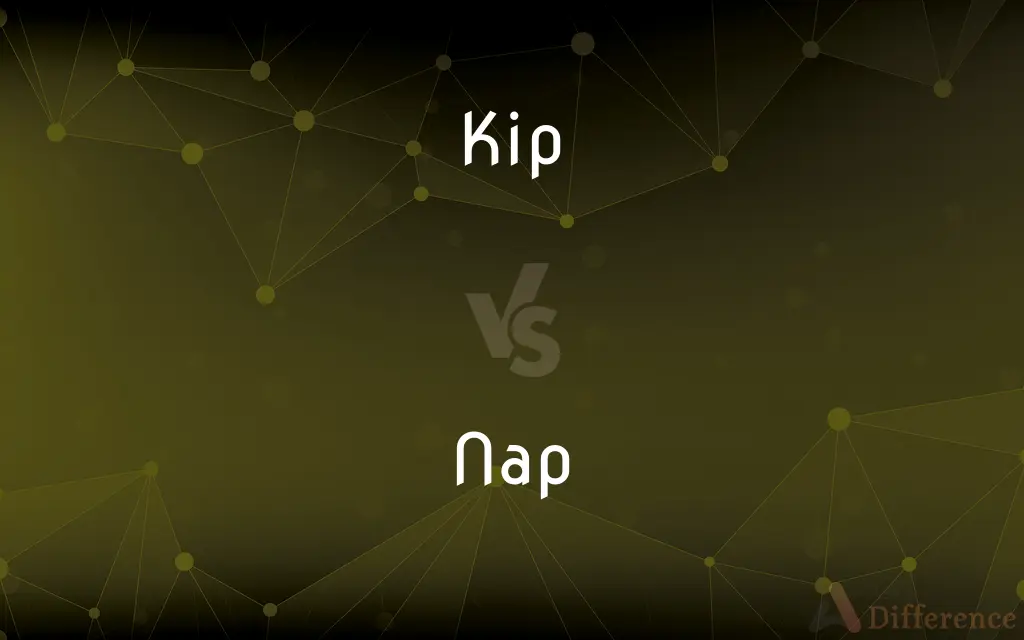Kip vs. Nap — What's the Difference?
Edited by Tayyaba Rehman — By Urooj Arif — Updated on April 3, 2024
A kip is a British term for a short sleep, typically informal or unplanned, while a nap is a brief period of sleep, often used for rejuvenation during the day.

Difference Between Kip and Nap
Table of Contents
ADVERTISEMENT
Key Differences
Kip, a term more commonly used in the UK, refers to taking a short sleep or doze, often implying a less structured or impromptu rest, possibly even overnight. Naps, on the other hand, are short periods of sleep usually taken during the day to refresh or rejuvenate oneself, recognized universally and often recommended as part of a healthy lifestyle for all ages.
While the term kip can sometimes imply sleeping in less conventional circumstances or locations, such as a couch or even a temporary accommodation, naps are typically planned and taken in a comfortable environment conducive to quick rest. The cultural context of "taking a kip" carries a casual connotation, perhaps after exertion or to pass time, whereas napping is deliberately used for its restorative benefits, including improving alertness and performance.
Naps are often categorized by duration and purpose, such as power naps, which are short to maximize alertness without entering deep sleep, or therapeutic naps, recommended for making up sleep deficits. The concept of a kip does not typically involve such distinctions, focusing more on the act of sleeping itself rather than its intended effect or duration.
In terms of health and lifestyle, napping is frequently discussed within the context of sleep hygiene and mental well-being, with studies highlighting its positive effects on cognitive function, mood, and physical health. Kipping, while not generally discussed in a health context, is acknowledged as a form of rest, though without the same emphasis on its benefits or strategic planning.
Despite their differences, both kips and naps serve the fundamental purpose of providing rest and rejuvenation. The choice of term may reflect regional language preferences or the informal versus formal context in which the rest occurs, but both ultimately acknowledge the importance of short periods of sleep in one’s daily routine.
ADVERTISEMENT
Comparison Chart
Origin
British English
Universally recognized
Connotation
Informal, can imply sleeping in various circumstances
Planned, often part of a routine for restorative sleep
Duration
Variable, can sometimes extend to overnight sleeping
Short, typically between 10 to 30 minutes
Purpose
General rest, often unplanned
Rejuvenation, improving alertness and performance
Context
More casual, can occur after exertion or to pass time
Health and lifestyle, with emphasis on sleep hygiene
Compare with Definitions
Kip
A British term for a short or informal sleep.
After the long hike, he took a quick kip on the sofa.
Nap
A short sleep taken during the day to refresh oneself.
She took a 20-minute nap to recharge after lunch.
Kip
Often unplanned and in various sleeping conditions.
He grabbed a kip in the car before driving again.
Nap
Categorized by duration and purpose, like power naps.
A brief nap of 10 minutes can prevent sleep inertia and boost energy.
Kip
Less about rejuvenation, more about rest.
Feeling exhausted, she decided to have a kip rather than push through.
Nap
Associated with positive effects on health and mood.
Regular short naps have been linked to reduced stress and better heart health.
Kip
Casual and not typically structured.
Finding himself with some free time, he took the opportunity to kip.
Nap
Often part of a health or productivity strategy.
Incorporating a power nap into his daily routine improved his focus.
Kip
Can imply overnight sleep in informal contexts.
We kipped at a friend’s place after the concert.
Nap
Planned and in a comfortable environment.
He set up a quiet space in the office for a quick nap during breaks.
Kip
See Table at currency.
Nap
A nap is a short period of sleep, typically taken during daytime hours as an adjunct to the usual nocturnal sleep period. Naps are most often taken as a response to drowsiness during waking hours.
Kip
The untanned hide of a small or young animal, such as a calf.
Nap
A brief sleep, often during the day.
Kip
A set or bundle of such hides.
Nap
A soft or fuzzy surface on fabric or leather.
Kip
A rooming house.
Nap
A trick-taking card game in which the players are each dealt five cards and everyone bids the number of tricks they intend to take, with the highest bidder deciding the trump.
Kip
A place to sleep; a bed.
Nap
The first bid of five tricks in this game, the maximum number in a hand. Also called napoleon.
Kip
Sleep.
Nap
See napoleon1.
Kip
A unit of weight equal to 1,000 pounds (455 kilograms).
Nap
To sleep for a brief period, often during the day; doze.
Kip
A maneuver in gymnastics, martial arts, and similar sports in which a person moves from lying on the back directly to a standing position by thrusting the legs upward and pushing off with hands placed palms-down near the ears. Also called kip-up.
Nap
To be unaware of imminent danger or trouble; be off guard
The civil unrest caught the police napping.
Kip
To sleep.
Nap
To form or raise a soft or fuzzy surface on (fabric or leather).
Kip
The untanned hide of a young or small beast, such as a calf, lamb, or young goat.
Nap
To pour or put a sauce or gravy over (a cooked dish) in a thin, even layer
"a stuffed veal chop napped with an elegant Port sauce" (Jay Jacobs).
Kip
A bundle or set of such hides.
Nap
A short period of sleep, especially one during the day.
Kip
(obsolete) A unit of count for skins, 30 for lamb and 50 for goat.
Nap
A soft or fuzzy surface, generally on fabric or leather.
Kip
The leather made from such hide; kip leather.
Nap
The common direction, on some kinds of fabric, of the hairs making up the pile.
If the fabric has a nap, make sure all pieces are cut with the nap going the same direction.
Kip
A place to sleep; a rooming house; a bed.
Nap
(British) A type of bet in British horse racing, based on the experts' best tips.
Kip
Sleep, snooze, nap, forty winks, doze.
I’m just going for my afternoon kip.
Nap
A card game in which players take tricks; properly Napoleon.
Kip
A very untidy house or room.
Nap
A bid to take five tricks in the card game Napoleon.
Kip
A brothel.
Nap
A cup, bowl.
Kip
A unit of force equal to 1000 pounds-force (lbf) (4.44822 kilonewtons or 4448.22 newtons); occasionally called the kilopound.
Nap
To have a nap; to sleep for a short period of time, especially during the day.
Kip
A unit of weight, used, for example, to calculate shipping charges, equal to half a US ton, or 1000 pounds.
Nap
(figuratively) To be off one's guard.
The regulators were caught napping by the financial collapse.
Kip
A unit of mass equal to 1000 avoirdupois pounds.
Nap
To form or raise a soft or fuzzy surface on (fabric or leather).
Kip
The unit of currency in Laos, divided into 100 att, symbol ₭, abbreviation LAK.
Nap
(obsolete) To grab; to nab.
Kip
A piece of flat wood used to throw the coins in a game of two-up.
Nap
(cooking) To cover (something) with a sauce. usually in the passive
Kip
(gymnastics) A basic skill or maneuver in artistic gymnastics on the uneven bars, parallel bars, high bar and still rings used, for example, as a way of mounting the bar in a front support position, or achieving a handstand from a hanging position. In its basic form, the legs are swung forward and upward by bending the hips, then suddenly down again, which gives the upward impulse to the body.
Nap
To have a short sleep; to be drowsy; to doze.
Kip
(Scotland) A sharp-pointed hill; a projecting point, as on a hill.
Nap
To be in a careless, secure state; to be unprepared; as, to be caught napping.
I took thee napping, unprepared.
Kip
To sleep; often with the connotation of a temporary or charitable situation, or one borne out of necessity.
Don’t worry, I’ll kip on the sofabed.
Nap
To raise, or put, a nap on.
Kip
To snatch; take up hastily; filch
Nap
A short sleep; a doze; a siesta.
Kip
To hold or keep (together)
Nap
Woolly or villous surface of felt, cloth, plants, etc.; an external covering of down, of short fine hairs or fibers forming part of the substance of anything, and lying smoothly in one direction; the pile; as, the nap of cotton flannel or of broadcloth.
Kip
To conduct oneself; act
Nap
The loops which are cut to make the pile, in velvet.
Kip
To perform the kip maneuver.
Nap
Same as Napoleon, 1, below.
Kip
The hide of a young or small beef creature, or leather made from it; kipskin.
Nap
A period of time spent sleeping;
He felt better after a little sleep
There wasn't time for a nap
Kip
A sharp-pointed hill; a projecting point, as on a hill.
Nap
A soft or fuzzy surface texture
Kip
A method or feat of raising the body when hanging or swinging by the arms, as for the purpose of mounting upon the horizontal bar. The legs are swung forward and upward by bending the hips, then suddenly down again, which gives the upward impulse to the body.
Nap
The yarn (as in a rug or velvet or corduroy) that stands up from the weave;
For uniform color and texture tailors cut velvet with the pile running the same direction
Kip
Sleep;
Roused him from his kip
Nap
A short sleep (usually not in bed)
Kip
The basic unit of money in Laos
Nap
A card game similar to whist; usually played for stakes
Kip
A gymnastic exercise performed starting from a position with the legs over the upper body and moving to an errect position by arching the back and swinging the legs out and down while forcing the chest upright
Nap
Take a siesta;
She naps everyday after lunch for an hour
Kip
Be asleep
Common Curiosities
Are naps beneficial for everyone?
Most people can benefit from short naps, but the ideal duration and timing can vary based on individual sleep needs and health conditions.
What's the main difference between a kip and a nap?
The main difference is cultural context and formality, with "kip" being a more casual British term and "nap" universally recognized and often part of a deliberate rest strategy.
Can a kip be planned like a nap?
While kips are typically more spontaneous, nothing precludes planning a short sleep using the term "kip," especially in a casual context.
How can I make my naps more effective?
To make naps more effective, keep them short (10-20 minutes), take them in a comfortable environment, and avoid napping too late in the day to not disrupt nighttime sleep.
Is taking a kip considered good sleep hygiene?
Taking a kip, like napping, can be part of good sleep hygiene if it helps meet one's rest needs without interfering with nighttime sleep patterns.
Are there different types of naps?
Yes, there are several types, including power naps for a quick energy boost and longer naps for more significant recuperation, each serving different purposes.
What are the health implications of regular napping?
Regular, short naps can improve cognitive function, mood, and even heart health, especially if they complement insufficient nighttime sleep.
Can taking a kip affect nighttime sleep?
Similar to naps, a kip taken too late in the day or for too long might affect nighttime sleep quality by reducing sleep drive.
How do cultural perceptions of kipping and napping differ?
Cultural perceptions vary, with some cultures viewing daytime sleep as an essential part of a healthy lifestyle, while others may see it as a luxury or indicative of laziness.
Why is napping recommended over longer sleep periods during the day?
Short naps can provide rest and rejuvenation without entering deep sleep, preventing grogginess upon waking and not interfering with nighttime sleep.
Share Your Discovery

Previous Comparison
Maid vs. Mistress
Next Comparison
Example vs. DescriptionAuthor Spotlight
Written by
Urooj ArifUrooj is a skilled content writer at Ask Difference, known for her exceptional ability to simplify complex topics into engaging and informative content. With a passion for research and a flair for clear, concise writing, she consistently delivers articles that resonate with our diverse audience.
Edited by
Tayyaba RehmanTayyaba Rehman is a distinguished writer, currently serving as a primary contributor to askdifference.com. As a researcher in semantics and etymology, Tayyaba's passion for the complexity of languages and their distinctions has found a perfect home on the platform. Tayyaba delves into the intricacies of language, distinguishing between commonly confused words and phrases, thereby providing clarity for readers worldwide.














































